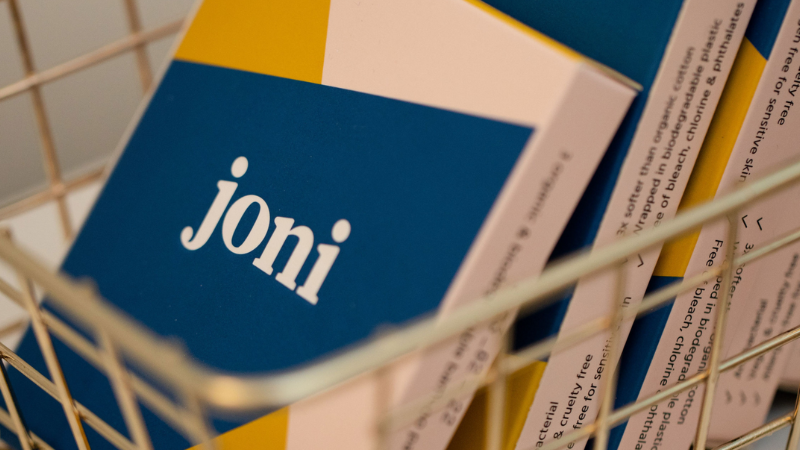You bet! It’s a big deal, and today—and every day—it's crucial we have this conversation, especially in the workplace.
We caught up with Linda Biggs, our co-founder and CEO of joni, to get her thoughts on why Menstrual Hygiene Day is important to driving menstrual equity forward.

Why do we need an International Menstrual Hygiene Day and how does it apply to the workplace?
International Menstrual Hygiene Day is crucial because it brings much-needed attention to the often overlooked and stigmatized issue of menstrual health. In my journey at joni, I’m reminded daily of the deep-rooted stigma that still surrounds menstruation. Because of that, we must refer to this day as Menstrual Health Day because the word ‘hygiene’ carries with it the connotation that periods are dirty and shameful—and that’s the stigma we need to get away from if we truly want period equity.
In the workplace, menstrual health is often a silent struggle. According to a 2023 study done by Women and Gender Equity Canada, one in four Canadians agree that periods are dirty and unclean, and about 22% agree that menstruation should not be publicly discussed and that menstrual products should be kept out of sight.
Because of this stigma, many face significant challenges, including lack of access to menstrual products and inadequate facilities.This day serves as a reminder that we must create inclusive and supportive work environments where these issues are addressed head-on and that talking about menstruation as a natural bodily function how we remove the stigma.
Considering that 87% of people who menstruate are caught off guard and then 67% will need to leave school and work to find solutions, having access to period care in the workplace—just like toilet paper—is not only a health issue but it also impacts productivity.
At joni, we advocate for federal and provincial policies that provide free access to menstrual productsand comprehensive menstrual health education. By doing so, we not only support our employees’ well-being but also foster a culture of inclusivity and respect.
The theme for this year’s Menstrual Hygiene Day is ‘Together for a #periodfriendly world’. How does this support your vision for period equity?
This is a great slogan and yet, at joni, we want to push it one step beyond being #periodfriendly toward a #periodempowered world. Not only should periods be accepted, but as a natural bodily function (let’s get real, it’s the reason we’re all here!), but menstruating should never hold anyone back.
By raising awareness, advocating for policy reforms, and providing sustainable period care solutions, we can break down barriers, uplift marginalized voices, and ensure that people have access to the products and support they need to thrive.
At schools, this means never missing class because of your period and being able to participate in extracurricular activities.
In the workplace, this means not having to leave work to get the products you need because you had an expected period—leading to increased productivity, increased workplace engagement, and more opportunities for advancement.
It’s not just a free pad or tampon. It’s about access and it’s about empowerment.
Why is menstrual equity important to you personally?
One of my earliest memories of my mother and grandmother was us in an old four-storey apartment building off Fraser Street in Vancouver where my abuelita lived and also cleaned the wooden hallways to subsidize her rent.
I have fond memories from playing in those hallways but I also remember times when we stood in line at food banks when the funds ended before the month did. As a young girl, I knew that period care options were limited and sometimes hard to get.
As an adult, I realized that I resonated more with a shoe brand or a water bottle brand than I did with any period care brand on the market. I didn’t want empowered tampon wrapper slogans, I wanted a brand that I felt represented my values and I didn’t have to choose between sustainability and a product that worked or a product that I could afford.
When I reflected on my experiences as a young girl and then my experience as a privileged adult still feeling like I did not have access to the products I needed, it became clear that there was a problem with the industry not having changed with the world around it.
In 2020, I founded joni with my business partner Jayesh Vekariya. Together, we’re hellbent on driving systemic change and ensuring that people can manage their period with dignity, regardless of their environment.
joni exists to challenge the status quo and inspire others to take action. It’s about recognizing that menstruation is a natural part of life and should never be a source of shame or disadvantage.
In the workplace, this means implementing practical solutions and fostering an environment where everyone feels supported and valued. Together, we can break down barriers and pave the way for a more equitable and compassionate world.

What can organizations do to acknowledge International Menstrual Hygiene Day?
First, organizations should recognize that moving towards period equity is not complicated. The first step is simply to provide pads and tampons just like you would toilet paper in washrooms. This is mandatory if you’re a federally regulated organization in Canada, but it’s also a good practice—and it’s good for business!
The next step is communicating your commitment to period equitable spaces and providing education opportunities. This is available across Canada through amazing organizations like The Period Purse, United Way Period Promise (BC) and Monthly Dignity (Montreal).
The ripple effect of such a simple step forward impacts absenteeism, increases productivity, and fosters inclusivity. Partnering with an organization like joni offeringsustainable commercial solutions, organizations can also uphold other company initiatives, from ESG to DEI.
